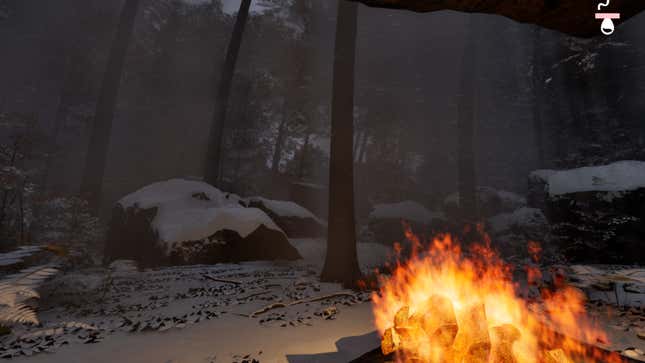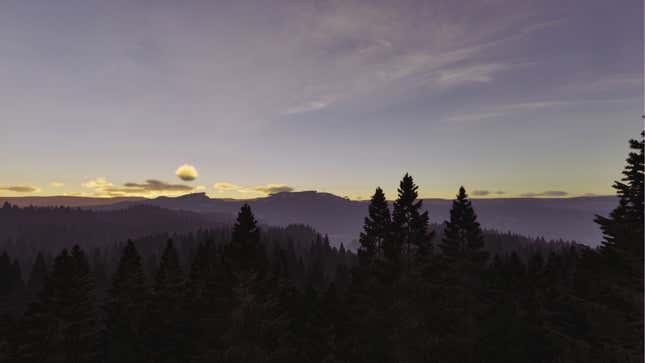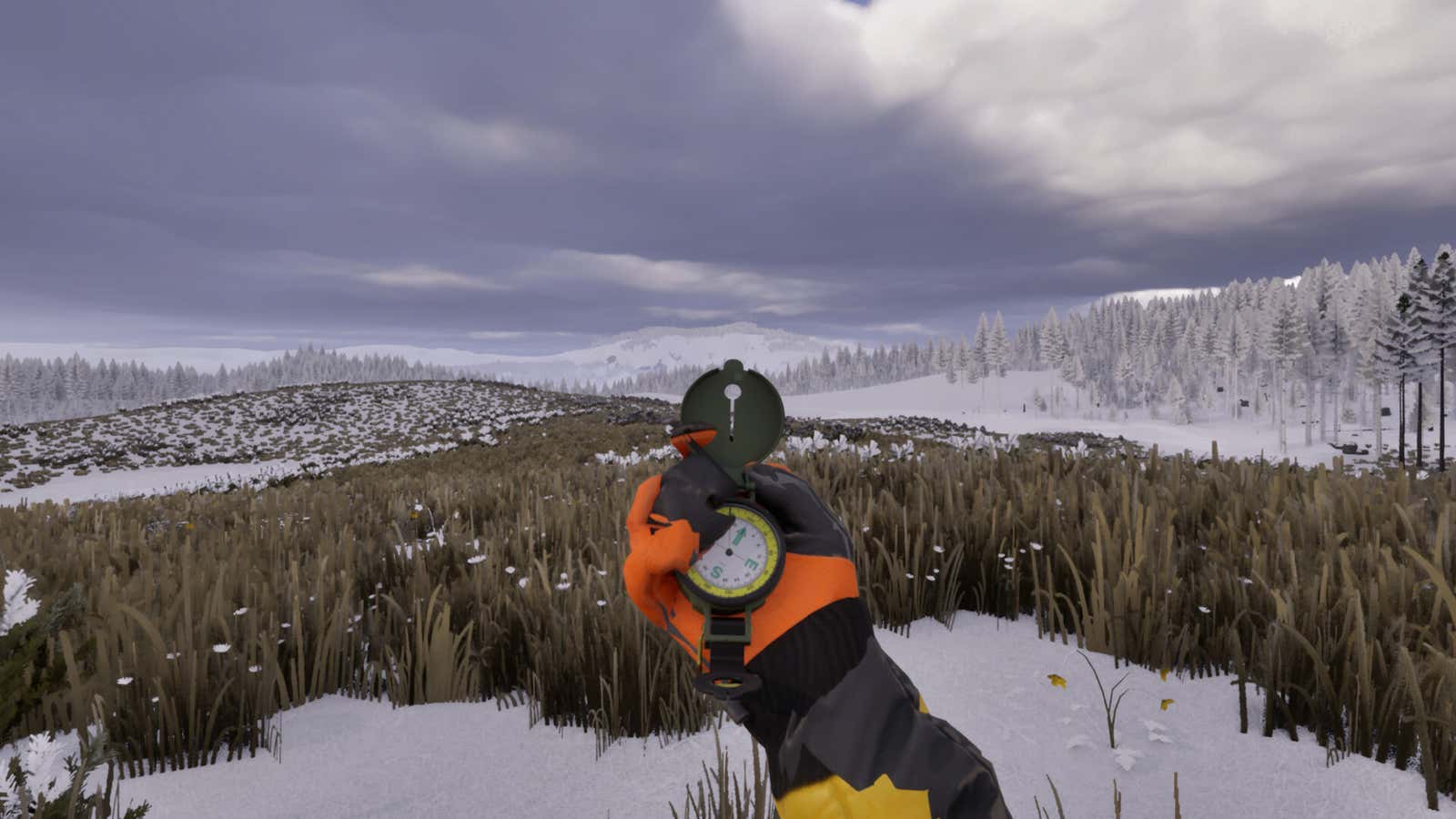Nearly a decade ago, Brendan Greene’s obsession with battle royales fundamentally reshaped gaming. Now the designer, best known by his online moniker “PlayerUnknown,” is toiling away on a new set of projects that could change much more than that if they’re successful. PUBG: Battlegrounds redefined online gaming. Instead of making PUBG 2, the long-term aim of Greene’s new survival sim Prologue: Go Wayback! is to be the first step toward redefining the internet itself.
“The scale, I think, of what we’re doing is kind of misunderstood,” he told Kotaku in a recent interview. “People aren’t seeing what it enables.” Greene is talking about a quote of his that zipped around online last month about wanting to build a metaverse. “PUBG creator Brendan Greene swears his infinite, mega-ambitious digital universe isn’t like all the others: ‘I want to build a metaverse because I don’t think anyone else is,’” read an understandably snarky headline by PC Gamer.
The concept of a shared online holodeck was buzzing around the tech world in 2022 but is now derided by many as empty hype. Facebook changed its name to Meta, invested billions in virtual reality tech nobody seems to want, and then quickly pivoted to the next investor craze: generative AI. “This year likely determines whether this entire effort will go down as the work of visionaries or a legendary misadventure,” Meta chief technology officer Andrew “Boz” Bosworth wrote in an internal memo earlier this month.

But PlayerUnknown Productions is not a $1.76 trillion tech giant and Prologue’s ambition is much more humble, at least initially, and not subject to the flighty whims of Wall Street investors. The upcoming Steam game is essentially a first-person walking sim in an 8x8km open world where you try to get across a map from the cabin you spawn in to a weather tower somewhere off in the distance. You need to worry about food, warmth, and surviving environmental hazards like lightning and snow storms caused by a dynamic weather system.
So, yes, Prologue’s emergent sandbox is far from the bullet-flying drama of PUBG. Having spent a little time with the beta version, I would even say it’s kind of boring. Imagine the narrative-driven first-person adventure Firewatch but without any of the story, characters, and intrigue. Greene joked that some staff consider Prologue a bit of a horror game because they think they’re hearing noises that aren’t really there. There is certainly plenty of room for more authored mystery in Prologue, but right now it mostly seems like a wilderness sim aimed at self-directed exploration and player-generated anecdotes.
“Kim [Nordstrom], our CEO, in one of the early builds, he spawned in a broken cabin with no clothing, and it was snowing, and he was like, ‘Damn, I’m going to die,’” Greene recalled. “And there was not much he could do at that point, like he tried to light a fire, but the snow came in and he died of hypothermia, just because that’s the type of the game it is.” He continued, “I’ve heard a bunch of, like, people waiting overnight on top of a mountain, then getting a vista as the sun comes up and not realizing they were there and and these kind of lovely moments, because the worlds are new every time. So every time you play, you get a slightly different experience.”
Like No Man’s Sky, Prologue uses procedural generation to create billions of possible open-world maps. Machine learning agents trained on satellite data and other sources of real-world terrain info create Prologue’s worlds, and then PlayerUnknown Productions developers go in and fine-tune the results to try to maximize the potential for interesting emergent scenarios as players try to cross rivers and mountains to get to their destination. Currently, a successful playthrough might take one to two hours, but the team is currently looking at ramping up the difficulty to make each hike more of a challenge.
While Prologue conducted player tests throughout the second half of last year, it’s clear Greene is excited to finally get the game into more people’s hands. He said he wants to build the game “with players,” and all of the new feedback and experimentation will no doubt be invaluable for proving if the map generation tech powering the PUBG creator’s vision, an engine called Project Melba, is robust enough to scale into massively multiplayer games and beyond.
That includes a second game consisting of millions of square kilometers of open world and millions of players to fill it. Think MMO survival sim Rust but on a completely different scale, the same way battle royale games turned traditional 6v6 deathmatches into sprawling 100-player affairs. And if that ends up working, the ultimate goal is Artemis, a sort of open-source, high-fidelity Roblox in which players build all different kinds of worlds and can move between them seamlessly. This metaverse, a 3D version of the internet as Greene calls it, is the long-term goal, potentially 10-15 years away, guiding Prologue’s development like a north star.
Even that might be overly ambitious. PlayerUnknown Productions is currently just 60 people split between the game and engine sides. Although Greene announced the team in 2021 (which remains independent), it took years to get anything out the door, like December’s Preface, essentially a demo for Prologue’s map generation tech. Though Greene is a visionary game designer (he was making battle royales long before PUBG blew up), he might not actually be that great at running a game studio.
“I’ve been trying to get this survival game made for about three and a half years, and I thought it was a simple premise, right?” he said. “It’s a new world every time, and then just a simple survival loop, I’m not asking for a moon and the stars here.” Greene said the core team was great but the leadership level, which he was responsible for, wasn’t working out.
A couple of years ago, though, a new executive team came in, including CEO Nordstrom (former chief strategy officer at Paradox Interactive), CTO Laurent Gorga (former tech director at Hangar 13), executive producer Petter Sydow (former producer at Massive Entertainment) and creative director Scott Davidson (former art director at Facepunch Studios). Gorga told Greene he wanted something released within a year when he joined, and things finally started moving. “Before was a little bit sort of siloed, and people were working on different things,” Greene said. “Now we’re fully integrated.”
Prologue is being built with Unreal Engine but the goal for future installments, or “stepping stones over a pond” as Greene calls them, is to transition away from proprietary technology and tools to exclusively relying on in-house tech like Melba and open-source solutions. After all, you can’t create the future of the internet with player connection and creativity shackled by licensing agreements. Greene’s vision flies in the face of what Epic Games CEO Tim Sweeney is currently doing with Fortnite, whose battle royale mode was once sued by PUBG’s publisher for copying it, and which has also recently tried to become more of a platform for world building than just a single game.

“What I’m trying to build is like trying to build the internet again, but in 3D so Melba, our engine, will be HTTP, essentially, it’ll be a protocol level that will generate whole worlds that just are all interoperable because they all share the same engine which is open source so everyone can build on it,” he said. “And that’s what I hope the metaverse should be, right? That it shouldn’t be controlled by large corporations that are essentially IP bubbles, hoping you’ll come and, you know, look at their IP, and then maybe sometime in the future, these two companies, or 10 companies, will talk to each other, and you’ll have interoperability. I don’t get that. I don’t see that as a metaverse.”
The machine learning powering Melba will be the key to achieving this, which is why Prologue itself doesn’t need to be a great game to succeed. If it proves out the tech, it will still have been worth it. “We want to give you access to the API or to the code so if you want to build your own tools in a different way, you should be free to do that,” Greene said. “But at least at our layer, I want it very much like a holodeck where you can tell it what you want and [Melba] generates it. Or you can easily draw a map on an in-game mini-map to draw the track for a motocross race you want, because you found a cool location in the world, and the game will do the rest. But that’s why I’m saying 10 to 15, years, because I think that level of tech and ease, it’s still some time off.”
For now, however, the focus is on Prologue. An Early Access rollout on Steam this year will begin building it into a more fully-fledged game, with new content and mechanics added along the way of the team responding to feedback, bugs, and balancing issues. A current river spawning issue can make it look like the seas parting for Moses on some maps, and one of the jackets players can currently find in the game is overpowered at the moment. But Prologue’s strict survival sim systems and austere presentation are likely to remain at its core.
“There was originally an idea I had of having a training mode where it sort of highlights all the objects, makes it more like a very basic training mode of ‘this is the world,’” Greene said. “We’ll see if we can add it during early access. But at the moment, I mean, my games are just, as I saw on Reddit, just ‘well fuck you get better,’ right? And I feel it should be continued in this game. It’s like, look, if you like it, great, otherwise, there’s 1,000s of other games out there.”
.
